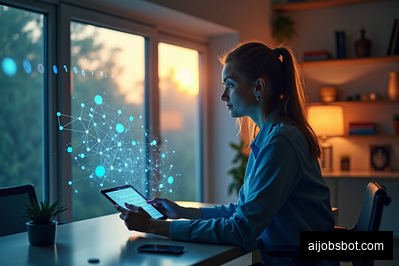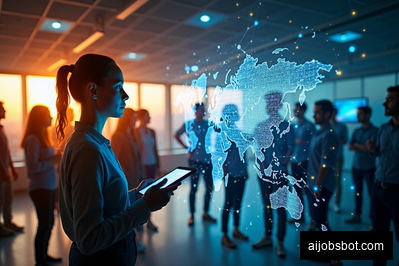Introduction
As the world continues to evolve technologically, the job market is no exception. Artificial Intelligence (AI) has become a significant player in the tech industry, particularly in job matching. Today's job seekers and employers are utilizing AI-driven platforms to find their perfect match. However, the question remains: how effective are these AI-driven job matching platforms in the tech industry?
To adequately address this question, we need to evaluate the efficacy, advantages, and disadvantages of AI-driven job matching.
Delving further into the realm of introductions within the ever-changing job market unveils a fascinating landscape. Employers now utilize sophisticated algorithms powered by Artificial Intelligence to screen resumes and identify potential candidates. This shift not only streamlines the hiring process but also raises questions about the impact on traditional recruitment methods. As job seekers navigate this tech-driven environment, crafting an introduction that resonates with both human recruiters and AI systems becomes crucial. The evolving dynamics between candidates and employers underscore the importance of adapting introductory strategies to stay competitive in today's digital job market.
Efficacy of AI-driven Job Matching
AI-driven job matching platforms, like Linked In’s Recruiter System Connect, employ machine learning algorithms and natural language processing to match job seekers with potential employers. Their efficacy is quantifiable and noteworthy. A study by Linked In found that 73% of recruiters filled positions faster when using AI-powered tools.
The AI's ability to analyze vast amounts of data, including a candidate's skills, experience, and preferences, and match them with suitable job postings, is unparalleled. For example, IBM's Watson Talent Match boasts an accuracy rate of 90% when recommending roles to candidates.
In the realm of AI-driven job matching, advancements continue to refine the process, enhancing accuracy and efficiency for both candidates and recruiters. For instance, platforms like Eightfold AI utilize deep learning algorithms to analyze not only job requirements but also candidate skills, experiences, and even soft skills to make highly tailored recommendations. This level of sophistication not only saves time but also increases the chances of finding the perfect match by considering a holistic view of each individual's strengths and potential. The efficacy of AI in this context is evident in the improved matching outcomes and enhanced candidate experience.
Advantages of AI-driven Job Matching
AI-driven job matching offers several advantages. Firstly, it eliminates the bias often present in human decision-making. For instance, Pymetrics uses neuroscience games and AI to match candidates with jobs, ensuring a bias-free process. Secondly, AI can process data at an unprecedented scale and speed, allowing for a more efficient and effective job matching process.
AI also provides personalized job recommendations based on a candidate's profile and preferences. As a result, it increases the chances of job satisfaction and retention. Lastly, AI can predict future hiring needs based on past hiring trends, enabling companies to plan strategically.
In addition to eliminating bias, AI-driven job matching offers a remarkable efficiency boost to recruiters. By swiftly analyzing vast amounts of data, AI can match candidates with job openings in seconds, a task that would take human recruiters hours. This efficiency not only saves time but also ensures that every candidate is given fair consideration based on skill sets and qualifications, leading to better job placements and higher satisfaction rates for both employers and job seekers.
Disadvantages of AI-driven Job Matching
Despite the advantages, AI-driven job matching is not without its drawbacks. While AI can reduce bias, it can also perpetuate it if the data used to train the AI is biased. For example, Amazon scrapped its AI recruitment tool after it showed bias against women. Moreover, AI lacks the human touch, which is crucial in understanding cultural fit and interpersonal skills.
Another drawback is the potential for data privacy issues. With AI collecting and analyzing vast amounts of sensitive data, there's a risk of data breaches. Furthermore, reliance on AI might lead to overlooking qualified candidates who may not have a strong online presence or whose skills may not be easily quantifiable.
One key drawback of AI-driven job matching is the potential for algorithmic biases to persist. Despite efforts to eliminate bias, AI systems can inadvertently perpetuate existing inequalities by relying on historical data that may be biased. For example, if certain demographics have been underrepresented in certain industries in the past, AI algorithms may inadvertently favor candidates from overrepresented groups, perpetuating the cycle of inequality. This highlights the importance of continually monitoring and refining AI algorithms to ensure fair and unbiased job matching outcomes.
The Future of AI-driven Job Matching
As AI continues to evolve, its impact on job matching will likely increase. Companies like Eightfold.ai are already using deep learning to match candidates and jobs at a granular level. Furthermore, AI's predictive analytics capabilities will enable more strategic workforce planning.
However, the future of AI-driven job matching will also depend on addressing its shortcomings. This could involve incorporating human insights into the AI decision-making process and implementing robust data protection measures. Moreover, efforts should be made to ensure the AI is trained on unbiased data to reduce the risk of perpetuating bias.
Looking ahead, the future of AI-driven job matching holds promises of even greater precision and efficiency. Imagine a scenario where AI algorithms not only analyze resumes and job descriptions but also consider subtle nuances like candidate cultural fit and long-term career goals. Platforms may soon integrate advanced sentiment analysis to gauge candidate enthusiasm and engagement levels during interviews, providing recruiters with invaluable insights. Furthermore, with the rise of AI-powered skill mapping, job seekers can expect personalized career development recommendations based on their unique strengths and aspirations.
Conclusion
AI-driven job matching in the tech industry has shown promising results in efficacy, speed, and objectivity. However, it is not without its challenges, which include potential bias and data privacy concerns. As we move forward, it is essential to leverage the strengths of AI while also addressing its weaknesses. This will ensure that AI-driven job matching continues to be a powerful tool in the tech industry.
By continuously evaluating and refining AI-driven job matching platforms, we can ensure they serve the needs of both job seekers and employers effectively and fairly. After all, the ultimate goal is to find the perfect match - a job where one can excel and a candidate who can contribute to the company's success.
In conclusion, the integration of AI-driven job matching in the tech industry not only streamlines recruitment processes but also enhances diversity and inclusion efforts. By leveraging machine learning algorithms, companies can ensure unbiased candidate selection based on skills and qualifications rather than demographic factors. For example, a recent study found that organizations using AI for recruitment saw a significant increase in the representation of women and minority groups in their workforce. This underscores the potential of AI to revolutionize hiring practices and create more equitable opportunities for all individuals.














